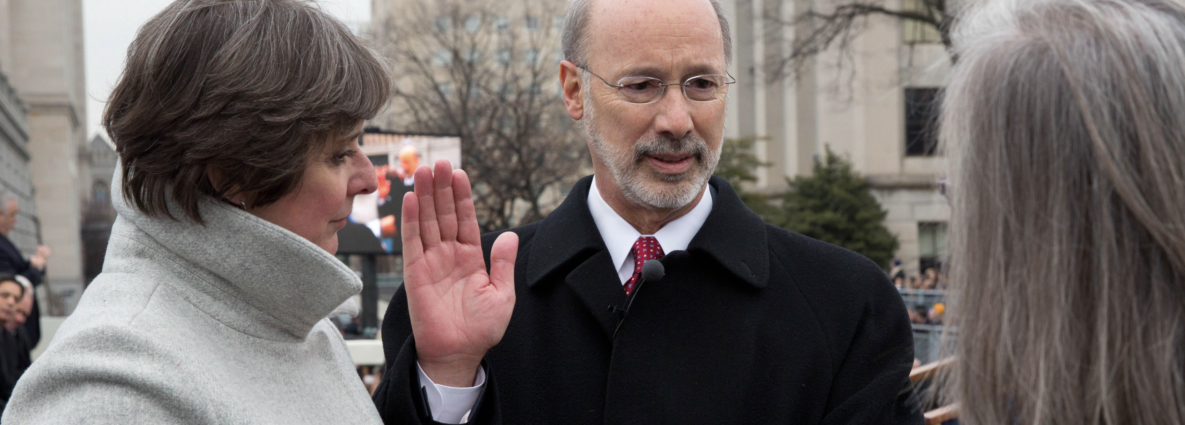SITUATION
Governor Tom Wolf won reelection with a commanding 58 percent of the vote share in a seemingly easy skate to reelection. However, the scale of Wolf’s victory belies how far the Wolf campaign had come and represents the culmination of a political strategy that began two years before this race was truly engaged.
Governor Wolf started the campaign with one primary asset: voters liked him. His serene demeanor, lack of pretense, and obvious commitment to improving the lives of average people endeared him to voters. Nonetheless, grinding budget fights with the Republican legislature convinced many voters nothing was getting done. Wolf campaigned on the promise to make oil and gas companies pay their fair share of taxes, which was an effort continually thwarted by the legislature. In an attempt to balance the budget, Wolf tried to increase gas extraction taxes and ended up with a long budget impasse. However personally popular he may have been, the Governor had become a symbol of Harrisburg dysfunction in the eyes of many voters.
In January of 2017, Donald Trump was inaugurated, having broken the Blue Wall in Pennsylvania. In a survey taken that month, a majority of voters believed the state was on the wrong track. The Governor managed a scant two-point margin against an unnamed Republican and started underwater on job ratings.
After a bruising primary, Republicans nominated State Senator Scott Wagner in May 2018. Wagner and Wolf both hail from York, Pennsylvania and both are successful small businessmen. After that, the two have nothing in common. Where Wolf is cerebral and accessible, Wagner is brash and abrasive. Like Trump two years earlier, Wagner promised voters aggressive change and did not mind offending people along the way.
The potential of this kind of candidate was obvious.
SOLUTION
The Wolf team understood that as long as the Governor remained tied to Harrisburg, his reelection was at risk. We conducted extensive research to figure out how to break that perception. Part of the answer emerged in reminding voters of the personal qualities that endeared them to Tom Wolf in the first place. Early advertising also stressed some of the progress the Governor made despite a hostile legislature, such as a record investment in public education and bi-partisan legislation mitigating the opioid crisis.
As important, however, was the Wolf’s team decision to “flip the script” on Wagner. Scott Wagner fashioned himself a “disruptor” in Harrisburg. But he also had been part of the Harrisburg scene for 30 years and had a voting record closely aligned with special interests in the capitol.
The Wolf team committed to defining Wagner as a Harrisburg insider.
That choice was not immediately obvious. Scott Wagner represented a target-rich environment for an opposing campaign. Wagner supported the same school cuts which cost the previous Republican governor his seat, employed aggressive business practices tracking down payments from customers, and has a habit of doing and saying outrageous things. But the Wolf team understood that if it maneuvered the Governor to the right side of change and Wagner to the wrong side, it would win this election.
Early advertising hammered Wagner as the “ultimate Harrisburg insider,” tying him to special interests, specifically to the oil and gas companies who spent 60 million dollars on lobbying to avoid paying their taxes. Earlier in his career, Wagner proposed taxing retirement income for the first time in Pennsylvania and called seniors the “greediest generation.” The Wolf campaign did not let older Pennsylvania voters forget it.
At the beginning of the campaign, the Republican candidate’s two strongest assets were change and taxes. By flipping the script on Wagner, the Wolf campaign took these assets away before Wagner could effectively mount a general election argument. By September, voters trusted a Democrat over a Republican on the issue of taxes and preferred an incumbent governor on “bringing the right kind of change in Harrisburg.”
Other factors also played a huge role in Wolf’s margin. Pennsylvania voters, like voters in other part of the country, had soured on Trump and were not inclined to elect Pennsylvania’s version of Trump to be their Governor. Wagner’s intemperance exploded late in the campaign when he posted a Facebook video threatening to “stomp” on the Governor’s face with golf spikes. Most notably, even in the worst of times, voters always believed Tom Wolf’s commitment to making things better in the state.
These factors amplified Wolf’s margin. But the strategy of flipping the script and the successful execution of that strategy turned what looked likely to be hard fight into an easy victory.

